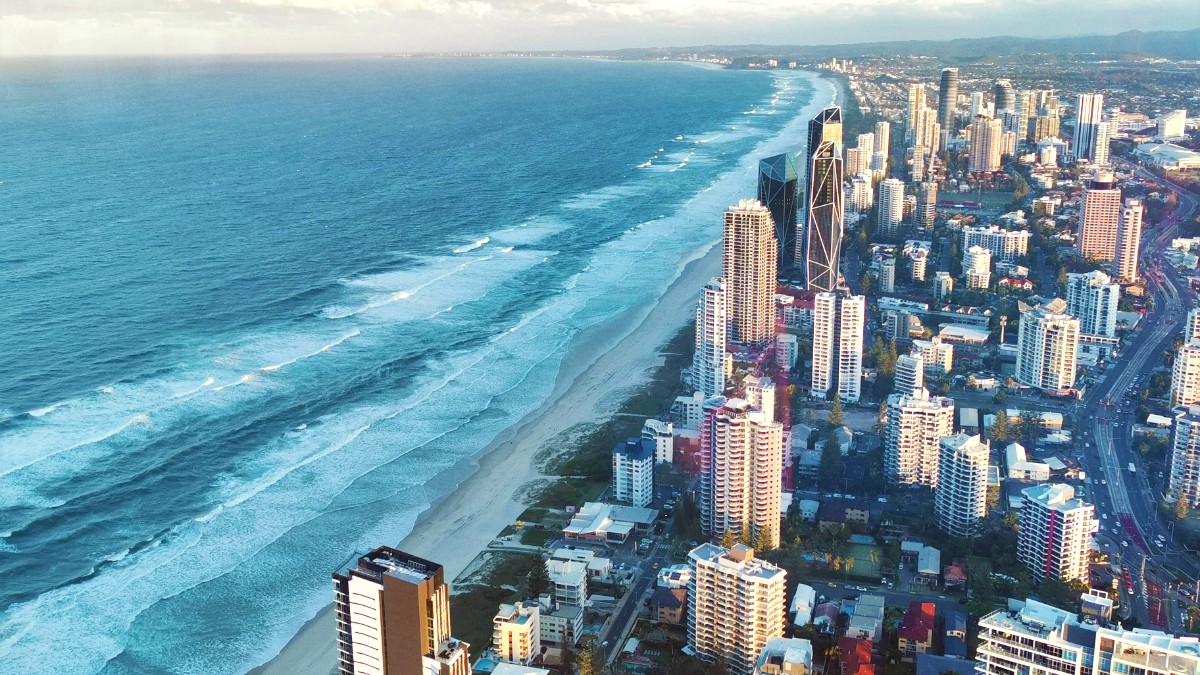
Queensland, Australia
Summer months are hot and humid. Pack lightweight, breathable fabrics like cotton, linen, or moisture-wicking synthetics. Include shorts, t-shirts, tank tops, and multiple Swimwear options. Bring beach cover-ups. A Light rain jacket or a Compact umbrella is useful for tropical showers. Sandals or flip-flops (known as "thongs") suit most casual wear.
Winter brings mild and dry weather with sunny days but cool evenings and mornings. Pack long trousers or jeans, Long-sleeved shirts, sweaters or jumpers. A warm jacket is needed for evenings and early mornings, especially if you dine outdoors or explore the hinterland. During sunny daytime hours, t-shirts or lighter tops may still be worn.
Comfortable Walking shoes or sneakers are good for city exploration, shopping, and general sightseeing.
Sandals or flip-flops ("thongs") are perfect for beach walks, poolside lounging, and casual outings.
Sturdy, closed-toe Walking shoes with good grip or dedicated hiking boots are suitable if you explore the Gold Coast Hinterland national parks.
Have both physical and digital copies of important papers. This provides backups in case of loss or theft.
Australia uses Type I power outlets (three flat pins). The standard voltage is 230V at 50Hz. Bring a Universal travel adapter. Most modern electronics are dual voltage (100-240V), working with a simple Plug adapter. For non-dual voltage appliances, a Voltage converter may be needed. Ensure your mobile phone is unlocked and GSM compatible for Australian SIM cards. Prepaid SIM cards are readily available from Telstra, Optus, and Vodafone at airports or supermarkets. Consider eSIM options like Airalo for digital convenience.
A modern Smartphone camera often captures high-quality photos. For higher quality or control, bring a mirrorless or DSLR camera with a versatile lens. B&H Photo has options. A GoPro or a dedicated Waterproof camera is ideal for water activities or rainforest adventures.
Utilize cloud storage services (Google Photos, iCloud, Dropbox) for backing up photos and important documents. This protects your memories and information if a device is lost or stolen.
Download offline maps, essential documents, and entertainment (movies, books) before you travel. This reduces reliance on internet connectivity and saves data.
Password-protect all your devices. Enable "Find My Device" features. Avoid leaving devices unattended in public places.
Pack a Compact first aid kit and any personal health items for minor issues and comfort during your trip. Include Band-aids, antiseptic wipes, sterile gauze pads, medical tape. Pain relievers like paracetamol/Acetaminophen or Ibuprofen. Antihistamines for allergies or insect bites. Anti-diarrhea medication and rehydration salts. Blister treatment like Moleskin. Small scissors and tweezers.
Insect Repellent: Highly recommended for evenings and hinterland visits. Look for products with DEET or Picaridin. Insect repellent is available. Sun Protection: High SPF (50+) Broad-spectrum sunscreen is needed. Also, bring Lip balm with SPF, and After-sun lotion or aloe vera for soothing skin.
Surfboards can be rented from numerous surf schools and beachside shops. If you are a beginner, renting is cost-effective, often including the board and Wetsuit. Advanced surfers might prefer their own board. Gear (masks, snorkels, fins, wetsuits) is typically provided by tour operators for snorkeling or diving trips.
A Small daypack (15-30 liters) is useful for carrying water, snacks, a light jacket, and a camera during day hikes in the hinterland. Reusable water bottles are highly recommended. A lightweight microfiber beach towel dries quickly and takes up less space than a traditional towel. A compact beach mat or sarong provides a comfortable spot on the sand.
For activities like surfing, jet skiing, or specialized diving, renting equipment locally is often more convenient and practical. Quality rental gear is readily available from reputable operators. Consider bringing your own items if you have specific preferences for comfort, fit, or performance (e.g., your own surf leash, a particular snorkel mask that fits well).
For transportation, a Travel pillow, Eye mask, and Earplugs are useful for long flights or light sleepers. A Light scarf or blanket can provide warmth. Small TSA-approved locks for luggage or hostel lockers. An RFID-blocking wallet or passport holder protects against electronic theft. A Money belt or travel pouch secures cash, cards, and passport in crowded areas.
While Gold Coast has well-stocked supermarkets and pharmacies, certain specialized items or specific brands of medications, toiletries, or snacks may be difficult to find or cost more than at home. If you rely on a particular product, bring a sufficient supply. A good book or e-reader for relaxing on the beach or during downtime.
Reduces plastic waste; tap water is safe.
Avoids single-use plastic bags at retailers.
Embrace local coffee culture sustainably.
Shampoo/conditioner bars reduce liquid waste.
Pack a rash vest (rash guard) for extended beach time or water sports. The Australian sun is intense, and a rash vest provides excellent UV protection.
Consider rolling clothes to save space and reduce wrinkles. Use packing cubes for organization and compression.